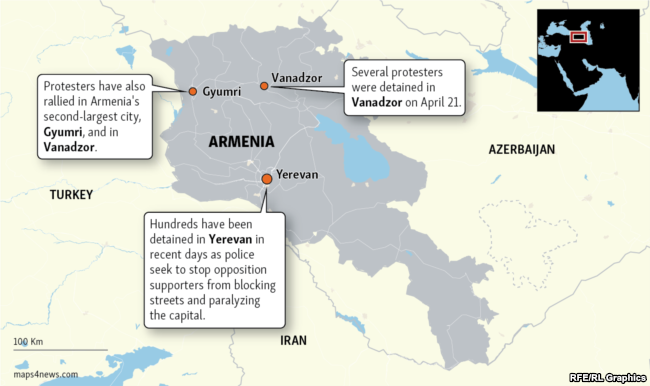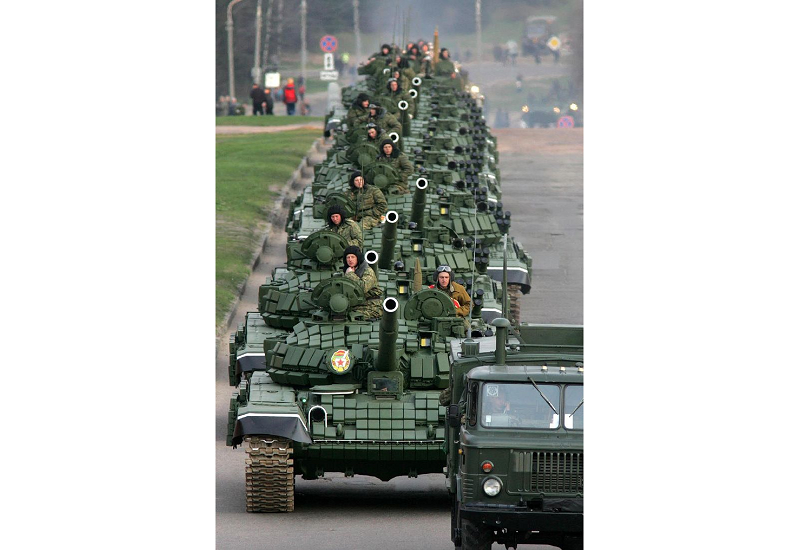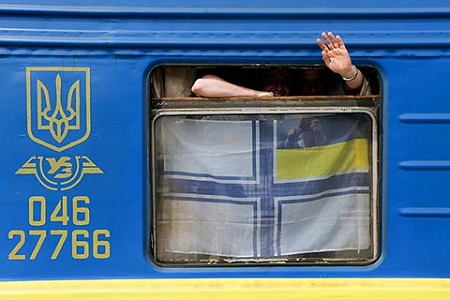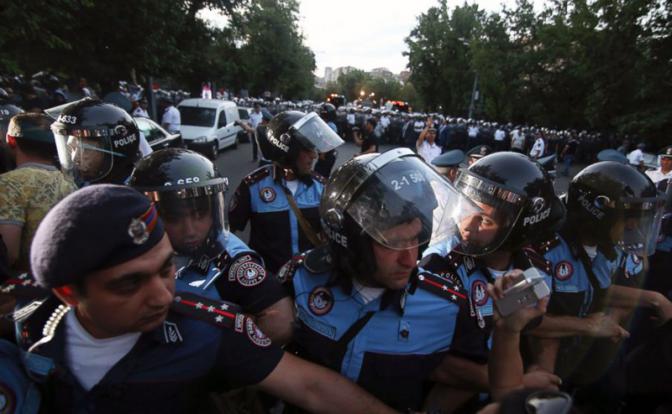The Prime Minister of Armenia Serzh Sargsyan stepped down after nearly 11 days of all-Armenian protests. His resignation was the protesters’ main demand.
They came out to the streets of the capital Yerevan and other cities of Armenia after Sargsyan was nominated for the position of the Prime Minister, having served as president for two terms.
“I am leaving the post of Armenia’s prime minister, the country’s leader. The street protests are opposed to my tenure. I am fulfilling your demand,” Sargsyan said in his resignation statement.

In 2015, then President Sargsyan pushed through constitutional changes making the prime minister more powerful than the president.
The presidents of Russia and Türkiye have resorted to similar moves. After serving two presidential terms, Russian President Vladimir Putin switched to the position of prime minister in 2008 and returned to presidency in 2012. Meanwhile, Turkish President Recep Erdogan became head of state after years as prime minister, having enhanced the powers of the presidency.
Critics say Sargsyan had a close personal relationship with Vladimir Putin and brought the 3-million post-Soviet country too close to Moscow.
“I am almost crying. You can't imagine the scale of rejoicing throughout the whole of Armenia now,” executive director of the Broadcasting TV Company GALA Karine Harutyunian commented on the news to Euromaidan Press. This rejoicing can be seen on these live streams - the first from Yerevan, and the second from Gyumri:
Her media is the only opposition broadcaster in the country. All the other pro-government channels did not cover the street protests.
Before the demand of the protesters was fulfilled, dozens of people had been injured during the clashes with police. Each day, the police informed about new detentions of protesters. Two cameramen of GALA were injured. Also, their website was subjected to Ddos-attacks. Its management relates the attacks to the coverage of the protests. Thanks to the help of its international colleagues, the media manage to cope with the troubles.
Karine also explained why Armenians protested against Sargsyan’s rule.
“The regime he created is run by his inner circle. He is connected to it by mutual criminal actions – corruption, devastation of the country, authoritarian rule. Holding a state position was impossible if the person was not a member of the ruling party. People and their families were threatened, elections were rigged. However the most decisive step happened after a referendum devoted to changing Armenia’s form of government to a parliamentary one. Sargsyan promised that he would not make claims to the post of prime minister. The referendum was falsified. During the nomination of the candidates, Sargsyan’s inner circle put him forward. It cased outage among the people.”
Harutyunian says that at the very beginning 95% of the protesters where young people, students. Others joined later. The lack of coverage on the central channels was not an obstacle for the protesters – social media again played its important revolutionary role. The opposition leader Nikol Pashinyan also had live broadcasts at his Facebook page.
“Some people trusted him, some considered him as a populist. But this time, many people decided to go after him,” Harutyunian describes opinions about the opposition leader.
Pashinyan is an activist who has always been in opposition towards the Armenian government. He used to be an editor and a manager of the opposition media armtimes.com. In 2008 he used to be a member of the pre-election headquarters of the candidate for the president position Levon Ter-Petrosyan. That time Armenians led by Petrosyan also came to the streets against the mass violations during the elections. In a result at least 8 people where killed. Pasinyan was wanted and later surrender to the authorities. In 2010 he was sentenced to 7 years imprisonment for organizing mass protests. And in 2011 released in honor of 20's anniversary of Armenia's independence.
Сoncerns were raised that the latest protests in Armenia can end violently and with fatalities like during the Euromaidan revolution, but they did not:
“I appeal to you as the country’s leader for the last time. Nikol Pashinyan was right. I was wrong. The current situation has several resolutions, but I will not invoke any of them,” Sargsyan said in his statement.
Despite her joy, Harutyunian recognizes that Armenia now faces hard times:
“People demand early parliamentary elections. We are now faced with the question of who will temporarily lead the country. The external debt of Armenia is about $7 bn, about 45% of the population are poor, according to the Freedom House research, the unemployment rate is high, people are leaving the country.”
The media manager does not assess Pashinyan as a politician, saying only that during these protests he showed himself as a trustworthy leader who keeps promises. As well, during the last days, he was repeating the slogan that Armenia will keep a balance between Russia and the West, but emphasized that the country will start to follow its own agenda and will not be ruled by someone else.
In his previous statements, Pashinyan said that Armenia was forced to join the Eurasian Economic Union. Also, he recognized that Russian-Armenia relationships were not a partnership, but a relationship of one speaking and the other listening.


![A "Pussy for Putin": In 2010, 17-year old Alisa Kharcheva in a group with other 11 students and would-be students of Moscow State University starred in an erotic calendar for Putin's 58th birthday as Miss April. In 2012, Kharcheva posted these photographs with a cat and Putin portraits in a personal blog post entitled "Pussy for Putin." Then she sent a formal notice to Putin’s office and posted her phone number on her LiveJournal entry just in case. “Until Vladimir Vladimirovich decides to pick up his [birthday] gift, the kitty will live with me,” she wrote. According to Reuters, in 2015, a business associate of Arkady Rotenberg, a close friend of Putin, transferred into her possession an apartment in a smart gated complex in a desirable part of Moscow. She was 23 at the time. (Image: Alisa Kharcheva)](https://euromaidanpress.com/wp-content/uploads/2017/01/Kharcheva_0411.jpg)


